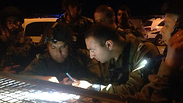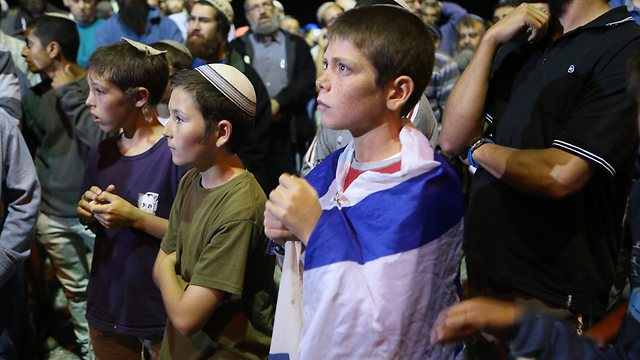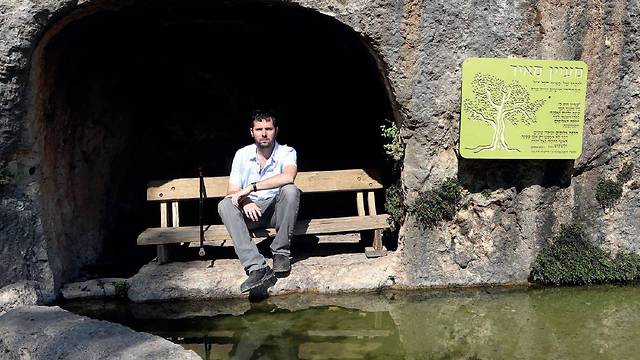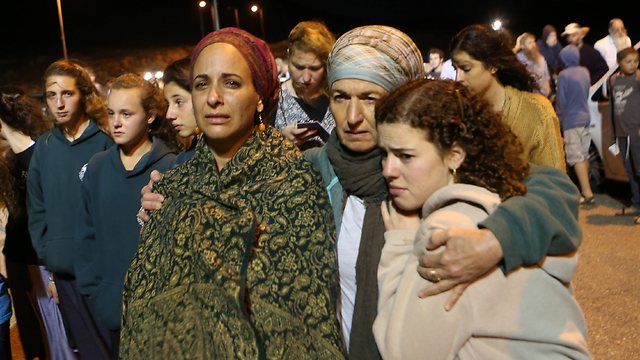
‘What we’re going through is war’
‘Every day there's terrorism on the roads and you can't know where it'll come from,' say settlers living in the Binyamin area of the West Bank, recently plagued with terror attacks. 'The government, the army, they all need to wake up. You can't abandon us like that.’
It is already night time, and on the narrow and twisting road leading to the junction where Malachi Rosenfeld was shot the night before, there are hundreds of people marching in a quiet prayer and protest rally.
This spot is high up, nearly 800 meters over sea level, in the eastern Samaria, and despite the fact summer is already here, there was a bone-penetratingly cold wind blowing here on Tuesday night. The road that leads to the junction starts at the Shilo settlement, crosses Shvut Rachel and the outposts Ahiya, Adi Ad and Esh Kodesh and continues down to the Allon Road in the Jordan Valley.

On both sides of the road there are rocks and fields, beyond which you can see the lights of the Palestinian villages Ein M'ghar, Jalud, Kusra and Duma, and on the other side, to the east, the lights of the communities of the Jordan Valley. Further east, the lights from the Jordanian side are clearly visible. This is an incredibly beautiful region in which nature is still primordial and its residents are still in conflict and bleeding.
The road is listed as road 5050, but the residents of the area and the local council gave it the name "Gideon Road" after Gideon Lichterman, who was murdered here in a shooting terror attack in May 2003, some 100 meters from where Rosenfeld was murdered this week. This cursed and bloody road is also the artery that connects Shilo and Highway 60 to the communities in the Jordan Valley and the eastern Binyamin Region.
Each of the area's residents has their own story to tell about this road. Moria Israel from Kokhav HaShahar told us that every time she drives down that road, and she does so every day on her way to work at the Ma'aleh Levona Ulpana, her heart is pounding with fear.
Israel Avitan, whom we met twice during the day - in the morning at the Rachel's Tomb yeshiva he attends and in the evening at the prayer rally that was taking place not too far from his home in Shvut Rachel - told us of his brother Moshe, who was shot by terrorists several years ago on this very road, and was seriously wounded in his eyes.
Others said they drive here and feel like targets at a shooting range.
Driving on the Judea and Samaria roads following the recent wave of terror attacks entails quite a danger. Stone-throwing has become a daily occurrence at any time of day, as did the throwing of Molotov-cocktails. Bus and private vehicles get pelted with stones as part of the daily routine. The shootings also increased. Two weeks ago, Danny Gonen was murdered when he was on his way back from a spring near the Dolev settlement. On Monday morning, the same day Rosenfeld was murdered, a Border Policewoman was stabbed at the crossing to Bethlehem near Rachel's Tomb and was seriously wounded. This week, a Magen David Adom ambulance also came under fire near Beit El.
"The terrorists decide where to act and when," Yaakov Netanyahu from Dolev best described the residents' frustration, "and we don't know who will be the next one to get hurt."
Increase in attacks
In the early evening hours on the day after Rosenfeld was murdered, the heads of the Binyamin Regional Council gathered at the Adi Ad clubhouse in solidarity with the local residents, who live not far from where the attack happened. It's an outpost on a windy hill that has yet to complete the process of becoming an approved and legal settlement, a process stuck for political reasons.
On the day of the murder, several hours earlier, the outpost's residents clashed with their neighbors from the Arab village of Kusra - almost a routine occurrence. The fighting broke out over structures the Palestinians set up near Esh Kodesh's agricultural fields. The residents of the outpost wanted to set up their own structures in response, and within minutes Palestinians from the village were called to the scene to launch firecrackers and fireworks into the air and hurl stones at the settlers. The army had to once again intervene and separate the warring sides.
The deputy council head and chairman of the local defense committee, Israel Gantz, says the escalation in Judea and Samaria has nothing to do with the violent clashes that happen on quite the regular basis between the residents of Adi Ad and Esh Kodesh and their Palestinian neighbors.
"There is a trend here, directed from higher up - from the Palestinian Authority - and it exists in all areas. It's not just a problem we have here in the Binyamin region. Over the past few months we've felt significant security deterioration. Not an evening goes by that we don’t have stone-throwing and vehicles and buses getting hit," Gantz says.
"An employee at the regional council came to me this week and told me she was on a bus with her children that was pelted with stones, and its windows shattered. Her children couldn't sleep all night. It causes great anxiety among the public. And from stones it moves onto Molotov cocktails and burning tires being rolled towards vehicles on the road.
"We have a Whatsapp group in the council for reports of security incidents, where we get a daily morning update. Recently, because of the increase in incidents, we've moved onto twice a day - morning and evening updates."
He reads out the report: At 2 am on Tuesday this week, stone throwing on road 443 east of the Maccabim checkpoint. That same night, at 2:45 am, a dummy bomb near Psagot. The day before in the morning hours, stones were thrown at an Egged bus at the entrance to the settlement Adam. Another bus was pelted with stones near the Hizma checkpoint. On Sunday, Molotov cocktails were thrown at trucks and cars at the 'Anata junction and the aforementioned MDA ambulance came under fire near Beit El. He is reading more and more reports. And these are only the incidents that happened in the Binyamin region.
"Our deterrence has been damaged," Gantz says. "Because Palestinian websites are full with videos showing IDF troops entering Palestinian villages and then fleeing without making any arrests, because they were pelted with stones. They are no longer afraid. The media is also to blame because it doesn't report on enough incidents. You hardly heard anything about the incident with the ambulance. There was a terrorist there who fired a round from 5-6 meters away and hit the ambulance's front windshield and its side. It was only a miracle that no one got hurt. And it went by with almost no mention, not even political."
Hours earlier we sat with Ehud Amiton in his home in Neveh Tzuf in the eastern Biyamin region, north of Ramallah. Amiton, 29, is the head of the Israel desk at the Tazpit News Agency, which uses the services of some 200 volunteer photographers located across the West Bank. Several dozens of other photographers and reporters report to the agency from other areas of the country. He gets to hear reports of incidents shortly after they happened, mostly from witnesses.
"People here are very conscious of the importance of sharing information. They feel the need to report on the incidents they experiences, and warn others. They send us photos of a vehicle whose windshield was shattered by stones, of protests on the side of the road, of burning tires. We immediately send everything to the rest of the media, but the fact of the matter is that it almost doesn’t get published at all because stone-throwing incidents, even throwing of Molotov cocktails without anyone being hurt, are like a car accident where no one was hurt. It is unfortunately of little interest to anyone," Amiton says.
Going to the springs is like going to the beach
The area Amiton lives in is webbed with springs. Near Neveh Tzuf, one can dip his toes into three different springs, and hike at the Shilo River and Wadi a-Zarqa. Danny Gonen, who was murdered near the Ein Buvin spring came there from Lod. The young people living in the area's settlements - Dolev, Talmon, Ateret and Neveh Tzuf - regularly travel in these areas, going down to the springs with flipflops, a towel slung over their shoulders, a guitar in hand and some beers, and spend hours there.

"What happened to Danny was a surprise, because for us going down to the springs is the most natural thing there is, like going to the beach for those who live in Tel Aviv. There are groups of hikers coming here, the young people from the settlements, the older people, almost everyone. We inform the security center and we go," Amiton says.
We followed him to the Meir spring near Nabi Saleh, a Palestinian village whose residents are not allowed to visit the spring. We still found a water bottle with labels in Arabic, and Amiton says that proves that the Arabs do come to the spring, which he says is not out of the ordinary. A group of young people from Neveh Tzuf is just leaving the spring, all wet. It's a real nice spot, with three pools surrounded by strawberry, fig and pomegranate trees and raspberry bushes laden with fruit that will soon be ripe for the taking.
"No one restricts us from coming here," Amiton says, while the noise of an approaching vehicle draws his attention. "Of course we are being careful, we inform the security center, the head of security, and leave with weapons. See, the army saw our vehicles here and sent troops in jeeps to find out who is here. Everyone's on high alert now."
From there, we go visit Yaakov Netanyahu, who lives in Dolev with his wife Esther and their five children. Some 300 families, 1,560 residents, 15 minutes away from the mall in Modi'in, 138 housing units built here only over the past four years and doubled the number of residents. Five rooms, two floors, 150 square meters, with a garden of 60 square meters, all for NIS 750,000, right near the Ein Buvin spring and a few others.
"There are amazing springs here," he says proudly. "And if it hadn't been for the Arabs, we could be the no.1 area for guest houses in the country.”
How many guest houses are there in Dolev?
"Six. Until Gonen's murder, things were going well. We had a calm period and we strategically invested in tourism. The entire area was branded as the Land of the Bible. Ultra-orthodox and national-religious come here, not seculars who feel like going to a guest house. On the day of the murder, we already had a cancellation for that Saturday, but the springs here are actually being visited more since, in solidarity with the settlement. Now they see a greater importance in coming. If, before the murder, you could've found 10 people at the Ein Buvin spring on a Friday, now you'll find hundreds."
In the morning, we visited Rachel's Tomb and found dozens of visitors, despite the stabbing there a day before. A group of women came out of Rachel's Tomb and took pictures with the soldiers.
Miri Shivhon, Shoshi Strikovski, Yafah Baruch and Tali Nissim all live in Los Angeles and came here for a visit to the homeland.
"Just as we were arriving, the complex was pelted with stones," Nissim said. "But we didn't panic."
"My husband told me, 'why are you going there?' My sister told me, 'just yesterday there was a stabbing there,'" Baruch said. "But I answered: We will come here despite of their opposition. They are the ones who should be afraid, not us. No one in Israel needs to live in fear."
"I brought my daughter Karin with me, a lone soldier who serves in combat engineering," Strikovski said. "She joined the army six months ago. My eldest, Adam, just got released from Golani a week ago. He fought during Protective Edge. Then, I wasn't sleeping at night and I was afraid. I kept checking all channels and internet sites in Israel, and downloaded the Homefront Command's app. I was walking around Topanga Mall in the valley and all of a sudden, a code red alert. People asked me what it was and I explained to them that at this very moment, there was a missile attack on Israel. So for us to be afraid to come here? I'm more afraid when I'm there."
So why aren't you coming back to Israel?
Almost all of them say together, "because it's very experience to live here."
A military command post close to home
Malachi Rosenfeld was murdered on his way back from a basketball game in the Binyamin Regional Council league, after he and his teammates from Kokhav HaShahar defeated their rivals from Givat Harel at a court in the settlement Eli. That night, Yaakov Netanyahu safely returned from another game in the league, of Dolev vs. Eli, and when he heard about the attack he could not help but think that he himself could have been the victim.
"We were really hammered, we lost by 26 points, but what was on my mind is that it could've happened to us too. Two weeks ago we were at a game in Eli, playing against Ofra, and lost then too. On the way back from there it could've happened to us too. Our sense of security has been shaken.”
His wife, Esther, admits that she's afraid. "I'm personally scared to get out of the house. If I have to go to an event at night, I'll think twice before going. It's stressful. Every other day there's a terror attack, people are killed and wounded, and you can't push it aside anymore. Danny Gonen's murder was here, not far from our home," she says.
"We have friends from Elon Moreh that we invited over for Shabbat but they're afraid to come. They tell us, 'your area is not so safe now.' Do you hear that? They're from Elon Moreh! Someone else's Arabs always seem scarier than the Arabs near you, because you don't know them."
After the rally in Rosenfeld's memory, we wanted to go to Tomer Eliyahu's house in Shvut Rachel, but he was at a housewarming party in Mevaseret Zion. Eliyahu, 37 years old, married with three children, is a hi-tech employee who works in Jerusalem. He is a disabled IDF veteran from the 1997 Wadi Saluki fire in Lebanon.
"Physically, nothing happened to me," he says. "Mentally, I was seriously hurt. Everyone around me burned to death."
We called him the next morning to ask how he was. "The party in Mevaseret Zion ended at 11 pm and my mother grabbed me by the arm and told me, 'stay here tonight, go back tomorrow.' She's worried about me. I told her, 'I can't abandon my wife and children at home alone.' And all of a sudden I realized I was using the word 'abandon,' which is a word from the army, and I was shocked by the level of anxiety I was feeling," he says.
"On Monday night, after the terror attack, the army set up a command post next to my house. They asked me to move my car, they brought big vehicles with antennas, a lot of soldiers, and it took me back to Lebanon, to the Taibe outpost. What we're going through here is war. Every day there's terrorism on the roads and you can't know where it'll come from. The government, the army, they all need to wake up. You can't abandon us like that."











